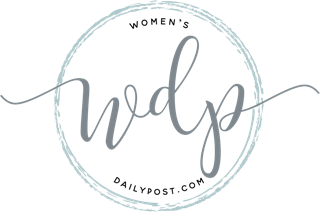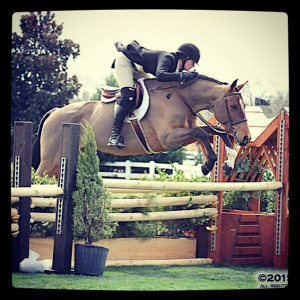Deloise Noble Strong is best known in the horse world – the Hunter Division of elite horse shows to be exact. She rides and trains inexperienced “green” horses and turns them into contenders. And she finds and matches her clients to the perfect horse to ride and show. For anyone interested in riding or showing horses, her Facebook page and her blog are informative, funny, irreverent, and inspiring.
But this post is very different. Last month, Deloise experienced a medical crisis that most people do not survive. She’ll explain in her post, and tell why she was one of the lucky ones who got through it.
We are sharing this post because it is a vividly authentic description of experiencing a critical illness. Most of us will, at some point, have a loved one go through major surgery and follow up surgery and a long, rollercoaster recovery. But no one really tells you what it’s like. If you think heart surgery recovery is healing an incision on the chest, you are unprepared for the mental, emotional and physical side effects and the ups and downs, two steps forward and one back, during the recovery process.
So we share it, in the hopes that if you go through this, it makes the abnormal feel a little less scary, and it makes us all more empathetic with those around us who are experiencing a major medical problem. Thank goodness Deloise is getting better every day! In her words:
Time Out
So far 2019 has been a great year! My calendar was full when it should have been weak, even in the coldest months, and planning ahead, I barely had a single day without an obligation, which excited me. Horses to ride, clinics to teach, planes to catch, road trips to take, I love being busy, I always thought it was better to be busy than be dead, right?… However, my life changed with a literal heartbeat one Sunday morning during a horse show, and all of a sudden the creeper in a black hoodie holding a scythe was hovering above me like ‘How you doin’??’
Crap. I hate that guy.
Riding a horse in a competition ring, I collapsed with no warning, desperately clutching my chest and mumbling about how weird I felt. I still had three fences left, but couldn’t get to them.
My memory of the episode has evaporated entirely, including several of the following days, probably for the best. My actual location is what saved my life. Had I been anywhere else, I would not be here today. I was competing, so EMT’s were right there on top of me, knowing exactly what to do while waiting for the ambulance to arrive. There was a defibrillator on the grounds, a grounds which truly is a second home to me. The group of friends and EMT’s stripped me of my riding clothes (boots have zippers) and tossed them in my car before the ambulance whisked me away and next thing everyone knows I am on the operating table having open heart surgery – an aortic dissection caused by an aneurysm. Unusual for a 47 year old woman, but not unusual for someone with chronic hypertension.
I don’t know why I have hypertension, I feel like I am the least stressed person around, I don’t consume a lot of salt, (my diet is not the root of the matter,) nor do I have any of the myriad of other reasons which may cause high blood pressure, but I have it. No one has been able to explain it, my family history shows nothing remarkable, I don’t ever feel bad, so I can’t say I was dedicated to taking my medicine religiously, some days I would remember, other days I wouldn’t, because like any farm girl, I always have a lot on my plate. I am a busy bee.
Or…. that was then…. as they say.
The first few days after the initial surgery were most painful for my family. I had lost so much oxygen, nothing was really working right. I had no memory, I talked funny, every time I opened my eyes I had to be told why I was in the hospital….four days of repetition and fear I wouldn’t return to normal. Lots of fear. The doctors tried to reassure my husband and mother that time was all I needed, but there is no way you could have believed them if you saw me. My husband admitted later just how scary it was….
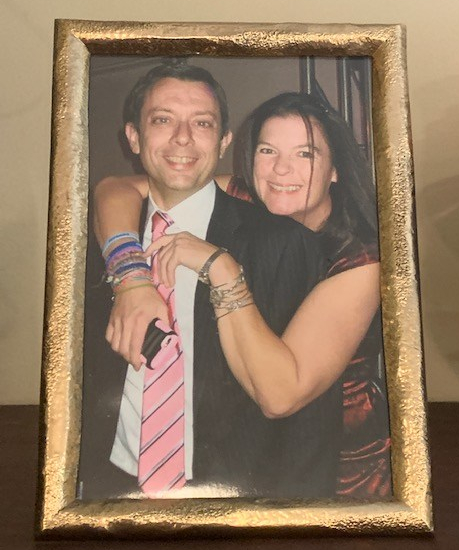
From his perspective, he wasn’t prepared for what he walked into. There was an abnormal amount of chaos around me at the hospital, and the little information he had received didn’t match the visual of seeing my body change color to a sickly blue. There was too much urgency as they wheeled me off to the OR, and the words ‘mortality rate’ echoed in his head. It doesn’t matter if it was 10% or 60%, those words are NOT two you want to hear together in a sentence, especially in a hospital right before you see your wife being wheeled away for emergency surgery. My parents were there, too, my Dad remembers talking to the ambulance driver and asking him if I was awake on the way down and speaking at all, which the driver confirmed, but said it was an incoherent mess of words loosely strung together, and they had kept me breathing, so could he get back to work now, please? and thank you.
Around 5 hours later, I had made it through. Unfortunately, as I woke up, it was clear I was still fighting. I didn’t even know what I was fighting, because my brain wasn’t properly connected, but Tom had to be there to watch me fight the tubes in my mouth providing desperately needed oxygen, the mask over my nose which the nurses had requested because I was fighting what was in my mouth, and the thousands of efforts I made to sit up and get out of bed. What was I even doing? I was apparently thirsty, so I only knew to ask for water, which I couldn’t have yet, so over and over and over again, he had to tell me to wait, calm down, I could have water later, and please stop trying to sit up. It was vital I only could receive swabs of moisture around my mouth, but I didn’t understand. My mouth was so dry. The nurses would change the subject, frequently asking if I remembered his name, but my reaction time to form a single syllable was insanely long, and each ticking second which went by caused him even more anxiety. Would my brain ever connect to my mouth again? It was clear I recognized people, which was a great sign, but beyond that, speech was really challenging. I was so slow to say his name.
This fight went on for three excruciatingly long days. A raw, unconscious effort around the clock to be somewhere else, and I had no idea I was doing it. Maybe the nurses are trained and used to this sort of thing, but my family isn’t, so the struggle to do the right thing became very real. You have to adapt and trust strangers very quickly, not a trait which comes naturally to my husband, so he had to work at it, work on understanding what the strangers were telling him, and trust their words when they said I will be ok. I didn’t look ok. I mean, I really, really looked far from ok.
Thursday my brain finally woke up.
I started retaining information. There were flowers in my room. There was a photograph of me with my husband, which now I realize was being used to trigger my memory. I needed help eating and remember ice chips and apple sauce. I stopped fighting. I stopped trying to sit up and get out of bed. The impact of the surgery was starting to hit me. I had to learn how to breathe again. I thought I had to learn how to talk again. I sounded like a gangster, and my speech was slow and erratic. I could think, but not connect to my vocal cords immediately, internally freaking out when my voice took a different direction than what I was used to, worrying it might be a permanent change. I had no idea how much worse it was just the day before, because no one told me about the first four days I had missed. I didn’t ask, because I was just thankful to be alive, now that my brain was acting more like itself, so internally I prepared myself to make adjustments, voice change or not. I kind of comprehended what happened to me, but my limited background in medical terms about the heart wasn’t providing too many answers, so I sat, waited, and stared at the walls. Relief washed over my entire family that Thursday.
The next three days were spent trying to feed myself, drink water, manage sleep (once I was conscious I wanted no part of the moving bed – like a water bed to prevent clots), and recover. I picked up my phone, saw hundreds of messages, and put it down again. Reading was too overwhelming for me. I learned that my horses were scattered around and being taken care of by really, really amazing friends. My mother was keeping everyone updated through Facebook so I could concentrate on healing. I let her, and as the first horror past, she became creative and more upbeat with those updates. People depended on her for any kind of information, and it surprised me how much better our system worked than silence. People still talk about her updates, it is amazing. Meanwhile, I struggled to get more comfortable. There was a huge incision down the center of my chest and holes where the tubes had been. I stared at it, but it freaked me out, so covered it back up with the hospital gown. I did try to stay positive, but I was wishing for less pain. I started walking again, my jelly legs struggling and burning, how had they disintegrated so fast? Does muscle just evaporate? I tried to imagine a normal day of work, feeding, riding six or sixteen, cleaning stalls, filling water troughs, dragging the ring, mowing, but here I was pushing a walker down a hospital hallway, and wobbling. It hadn’t even been a week yet. Damn.
Once, even in the first week, I convinced the nurses to let my husband wheel me outside to breathe some fresh air. I lasted less than 10 minutes in the chilly temps, but it helped to feel less like a trapped rat. I started to see the light at the end of the tunnel. We had a plan. Physical Therapy would start after the weekend, and I would gain my strength back. I had already been in the exercise room, and couldn’t wait to get started. By Sunday, the pain was starting to fade a bit. Positivity, positivity, positivity.
And then I woke up Monday morning.
I don’t know anymore what kind of pain tolerance I have. I used to think it was quite high. Two years ago I suffered a compound fracture and my bones blew through my skin, boots, and chaps, and I didn’t even cry. I remember squeezing a hand pretty tight to get on a stretcher though. Right before that I underwent a hysterectomy and hardly took any pain medication. The following year I shattered all the bones in my foot and continued riding and walking for 24 hours before bothering to get an X-ray. I ended up in a cast for 6 weeks. Every bone was broken. I was simply annoyed. Other than those instances, hospital visits had been rare for me.
The pain that Monday morning was nothing I was prepared for. Not a single medication touched it. I couldn’t move, and it was all I could do to attempt to breathe in order to stay alive. I was terrified. Something was really wrong. Not only that I was swelling all over with fluid, and my veins had vanished. My arms were already black and blue from the week, and after several failed attempts to get a new line in, I was forced to call in a favor. I knew oneperson who could help me so I scrambled for my phone, praying she was working at the hospital that day. I couldn’t believe I had a connection at a hospital, but I did. I took advantage of it. Miraculously, she was there.
Despite not doing a very good job holding back the tears when I heard her voice, I somehow explained what I needed and she instantly had an answer, and told me not to worry. The nurses on my floor were grateful, and stood back. Thirty minutes later my doorway was darkened by a very imposing but confident paramedic with a machine in tow. Relief washed over every part of me. He hooked up an ultrasound to my arm, scanned for all of 30 seconds and got a line in, explaining and chattering all the time. My vein was tapped. My swollen arms conquered.
I was sent for a cat scan, then sent back to my room to wait with my husband.
My heart surgeon at that hospital came to talk to us. He wanted to refer me to another hospital to be fixed. I could feel both eyebrows lift toward the ceiling and stay there. There was fluid rapidly collecting in my lungs, and another questionable area was presenting itself, which may indicate a leak from the initial surgery. Like a blood leak. None of which was music to our ears, so he promptly called in a favor to a colleague at University of Maryland, and we started the process of being transferred.
Apparently, being transferred from one hospital to another is one of the most complicated procedures known to man, and suddenly no one knew anything. We waited nearly 18 hours with nurses or coordinators telling us a ride would be there within the hour. My husband closed me in my room around 10 pm so I could try and attempt some sort of semblance of sleep. I managed like 3 hours. At 5:30 in the morning, the paramedics arrived to transfer me. To this day, I have no idea why it took 18 hours to go 20 minutes down the road.
Once transferred, the new staff was eager to get started with new tests. The lack of sleep, lack of information, and pain was really taking its toll on me and I was starting to unravel. My husband had to remind me rather sharply I was only here because the original surgeon had pulled a tremendous favor, and I had to respect the people around me trying to help, and I took a shallow breath and calmed down. A lot of what was happening was behind the scenes, with surgeons analyzing tests and results from labs, not one on one conversation, so I was trusting ghosts, instead of faces. I really had to dig deep for faith. Wednesday I was finally sent down to remove the fluid around my left lung… This is a process you are awake for, and it is truly terrifying, and dangerous. You can risk collapsing a lung. They make you sign special paperwork, and ask if are really sure you want to go through with the procedure. Twice.
I was escorted into a small room, sat on a bench, my back was exposed to the doctors behind me and scanned with an ultrasound. They drew an X under a rib. My arms were folded up in front of me on a table. They told me to hold my breath as they pushed a needle through my ribs to get to the fluid. I felt the needle, and wanted to pass out. Then, with a bag, they started the extraction. Over 650 ml of fluid came pouring out of my left lung, and they asked if I wanted to see it. Uh no? Just hearing it splash on the table was making me dizzy. Then it was over. I can’t say I felt an immediate improvement because I was feeling the sting of a large needle in my back, and was more or less stunned. It wouldn’t be until the next morning I woke up and went omg! The procedure worked! I felt fantastic for the first time in days! My spirits were lifting! I could breathe again!
The morning rounds started, doctors appeared to relay to me that my right lung also had fluid in it, so maybe I should return to the same unit to address it. I wasn’t excited. However, I had to go down there. This time, it was a different set of specialists, and they seemed less enthusiastic about the procedure. There was remarkably less fluid showing up on the ultrasound, so they gave me a chance to really ask a lot of questions. Would the fluid go away on its own? Yes, it was not nearly as much as on the left side and had a pretty good chance of reabsorbing into the body. Would they bother in a normal situation to scrape a small amount of fluid and risk a lung collapse if it wasn’t vital to survival? no. They would not. So I thought about it, eventually deciding to pass. They sent me back to my room, and I spent the afternoon walking the halls, hoping I had made the right decision. It was a weird negotiation to have, and what kind of medical knowledge do I actually have? none…
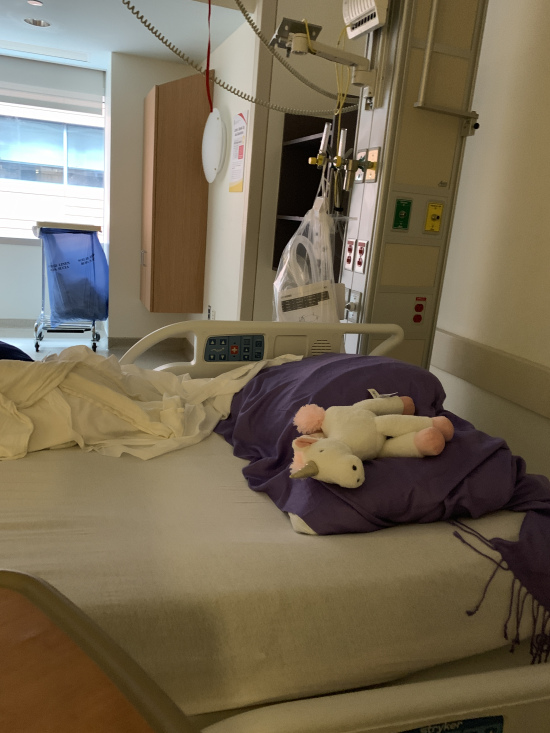
The nurses started making suggestions about going home.
I started feeling hopeful. I could almost feel my bed at home, I could almost see my cats. To pass the time, I colored Unicorns in a book someone had given me. I had had a few visitors during the week, each offering a few items to keep me busy, which was proving to be quite helpful.
Friday morning I looked up from my coloring book to see a team of doctors enter my room and was introduced to an actual surgeon…. well, this was odd. I listened as he explained what all of the other doctors in the cardiac unit were worried about. Oh no. I watched numbly as he drew a terrible picture on the whiteboard and illustrated where the leak was located. What was he even attempting to draw? Was that a heart? My heart? There were channels, and weird spikey things coming out of the center. He made a little oval shape and said something like ‘pool of blood’. I heard open heart surgery again. Time literally slowed to a crawl. I heard valve, I heard cow valve, then metal valve, then pig valve. Omg, are they letting me choose what kind of valve I want inside of me? Think clearly, make a rational decision. I was not offended by animal parts inside of me, so confidently elected for a cow or pig valve. Why did I seem so confident about picking a VALVE? By their explanations, a metal valve was very dangerous and complicated for a person like me. I don’t need any more complications. Was this real life? I guess it is a new real life. I sighed. He asked if I had questions? What was I supposed to ask? I shook my head. He said ok, I’ll see you downstairs tomorrow morning and we will do this. He clapped his hands together and left the room. We stared after him and his team. I looked at my husband. Pig valve, right? Good choice?
For some reason I thought the leak spotted at the previous hospital had turned out to be a non-issue, but I was wrong, it was just an issue which needed addressing after the other issues…. man, this was some luck.
The day was filled with people coming to ‘prep’ me for the next day. My husband looked exhausted, but dutifully said everything was going to be ok. We had to get it done and not carry any issues with us out the door. He promised to be there before I went in for surgery, although I thought that was a bit silly. We had no idea if it was going to be a three hour or eight hour surgery, and what could anyone do but wave as I was wheeled away in the bed? The anesthesiologists peppered with me with questions and explanations. I was least excited about this part because I knew I was going to wake up feeling completely frozen based on past experiences. Like thinking I was in Siberia for some reason. Everyone reacts differently, I guess.
As per every previous day, a nurse pulled my blood at 4:30 am. I hadn’t had one person miss a vein all week, the bruises were starting to fade, and I marveled at their accuracy and confidence. It was weird. Now, there were additional IV’s attached to my neck as well as semi-permanent ones in each arm. Labs were required to be pulled separate from the IV’s, so I was still stuck each and every morning, regardless, to make sure my blood levels were correct. Funny the things you get used to.
At 7:30 I was retrieved. I started a long, unnerving journey to the Operating Room, my files in a binder resting on my leg. We stopped in a hallway. There were no more pictures of horses on the walls. The giant wash sinks were very real. A cap for my hair was placed on my head. There was a totally different atmosphere outside the OR. The intensity of perfection and sterilization crackled around me. The techs asked me why I was there. I answered, considered sarcasm or a joke, but no joke came out. I was once again told about the procedure and eventually wheeled into the sterile room. The lights on the ceiling were very real. I was asked to slide myself to the operating table. I obeyed. I started really looking at faces, or parts of faces. I could feel my heart pounding. People never stopped talking, reading my file, going over every detail. Then, I was gone.
Sure enough I was shaking. An uncontrollable shivering gripped me from my head to my toes. It didn’t stop, even after more blankets were tossed on me. There was something in my mouth. I wanted it out. I couldn’t open my eyes. My tongue tried to remove the breathing tube. I shook and shook and shook some more. “Dulany, you did great! You are in the ICU, ok?” I didn’t want to shake. I was worried I was going to choke. I could hear voices asking if I was uncomfortable. I could hear them discussing taking my breathing tube out. Please, please. Get it out, I could only say to myself. I continued shaking. More chatter. Finally the nurses started working on the obstruction in my mouth and I started to calm down. What is it with me and tubes in my mouth? The shaking started to slow down and I could open my eyes. ICU. Another unit in the hospital.
I never received a new animal valve. Mine ended up being in perfectly good working order, (so the pig parts waited on ice for someone else) and the doctors were able to clean up the leak easily enough, so the surgery was just a few hours long. This was good news.
The only thing I couldn’t get comfortable with was the fact that there were four drainage tubes stitched into my chest and they ached. If they hadn’t hurt so much I think I would have bounced right on out of ICU but having tubes sewn into your boobs is not cool. I didn’t want to move. My nurse was wildly patient with me. Not moving is apparently not an option. I said I would move next week. She said well you are going to get out of bed tomorrow, sista, and walk across the room, and in the meantime we have to roll you around every few hours so you don’t get bedsores. Then I am going to take the pee bag out and guess what? You will have to actually use a bathroom. I stared at her. She ignored me and adjusted pillows, propping me up so I would drain some more fluid out. I didn’t sleep the first night, but by the second night exhaustion set in. The nurse peeked in, but didn’t disturb me. I was learning how to sleep with tubes in me. I gave up on the pain medicine doing anything. The following morning, I had to learn how to walk again. I figured out how to roll off the bed, with some help, but my legs were so weak, they could barely hold me up. I shuffled. There was zero modesty left in me at this point after days of poking, studying, stabbing, and whatever else had to be done, so learning how to pee again was done with an audience, and took time. Funny the things you have to concentrate on. I had a roommate briefly who seemed to be out of the twilight zone. She screamed and moaned but could never identify where she had pain. She refused to talk, only scream, and flat out refused to cooperate, not even saying her name for the cute x-ray technician (he could get anyone to talk). In a way this was good for me, because it made me try to be a better patient. I wasn’t sorry to see her change rooms, but you never heard one complaint out of me regarding the screaming. I focused on forcing my crippled body to move. And pee.
Finally I moved to the ‘step down unit’. Normally, I think it is about three days here and they want you out. I was ready. The first night in the new unit was excruciating because my body was on fire. I thought for sure the same thing was happening after the first surgery, and my body was filling up with fluid, but I had tubes continually draining, so actually I just hurt. I tried sitting up, I tried adjusting pillows, I tried the chair, I tried leaning back, nothing eased the pain. My ribs felt broken, my back, omg my back was giving up. My husband called my mom who called in a friend to sit with me so he could get some rest. He was just so damn tired. I was asking for muscle relaxers, so they tried some Robaxin. I managed an inside joke to myself. With everything else, I was now on Lasix and Robaxin.
I didn’t want anyone to see me like this, but I was grateful for the company that night. She said later I didn’t look good. She helped me back into the bed and we crossed our fingers it would pass by morning. I had learned to count, so I stared at the railings of the bed and counted to 100. I counted to 200. Breathe. Count. Repeat. She left.
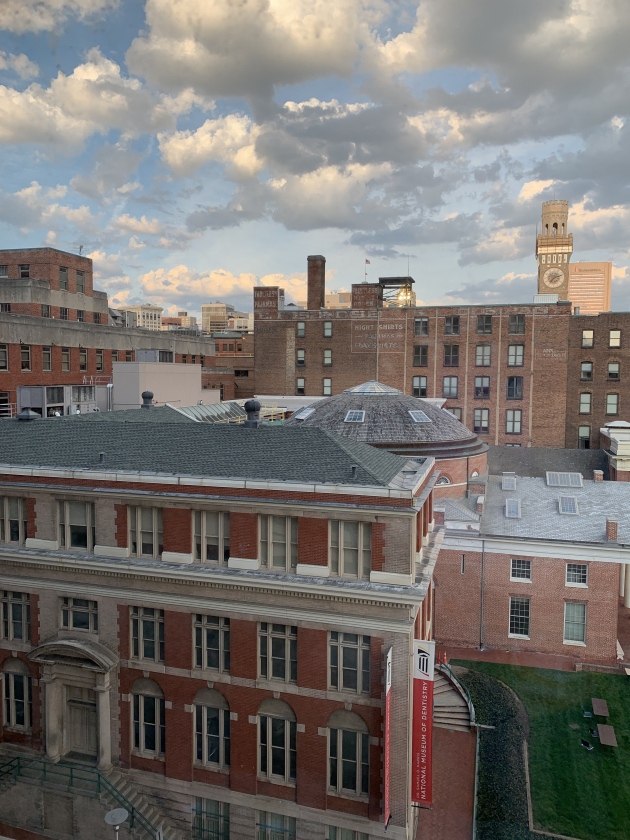
By morning, I was indeed better. Whatever was going on had vanished, and I was steadily improving. The days were starting to blend together, for sure, but the clarity in my head was returning. Every day I felt ready for the next step. The first set of tubes were removed and this deleted a tremendous amount of agony. I started to bathe myself, and tried combing my hair. Going three weeks without washing your hair is gross. I tried once bending over under the faucet to sort of wash it with some baby shampoo which was offered to me, but this was sort of a pathetic attempt to solve a big problem. I needed my home shower.
My appetite improved steadily, and with no restrictions, I was more or less free to eat whatever I wanted. The menu choices were sparse, however, and not always palatable, so I started asking for more food from home. Healthy snacks started to arrive during the week. Things were really looking up. T-shirts and leggings also showed up from home. I tossed the gown aside for good.
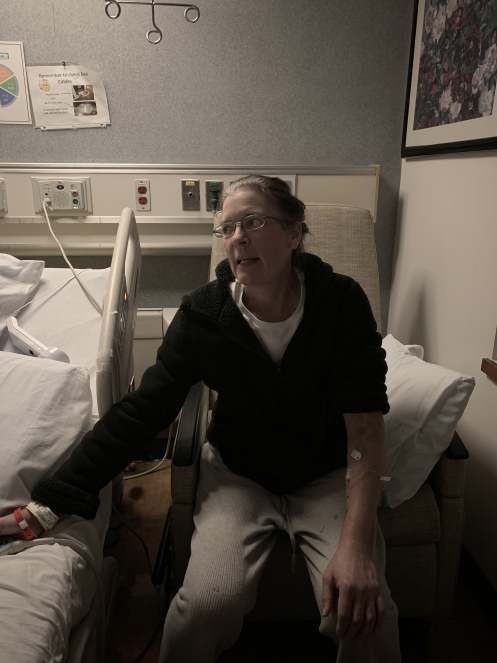
There was only one thing. My body refused to show reaction to the blood pressure medication. Instead, it skyrocketed.
So each morning the nurses and doctors were telling me I was ready to go home, and by the afternoon, they were like uh-oh, this is not good, as they watched my numbers bounce to unacceptable highs.
The professionals experimented. I waited. I wished they would stop suggesting I could go home soon. They asked me if I had white coat syndrome….. I thought of five different sarcastic answers for that question, but settled with ‘no, I do not’.
The PT guys escorted me around the halls, but I hadn’t breathed real life oxygen in two and a half weeks, so I started making suggestions about going outside. They surprised me by getting permission! I wasn’t exactly prepared, had no shoes, but when they came in my room and said guess what? I jumped at the opportunity, pattered downstairs in socks and blew through the doors and out onto the street. I didn’t even care that I was walking around the dirty streets of Baltimore in socks, wired to the gills with a heart monitor, with some stranger talking about horses and Alpacas, I was outside! It was a small thing, but it made all the difference in the world. I could feel the sun on my skin. My legs might have been shaky, but they were moving! My husband brought my shoes the next day.
I battled with frustration.
I am not ashamed. The fight I have inside me is the same fight I used to stay alive. Every once in a while that fight showed up in public as frustration. Very few people understood, so seeing me vent for five minutes triggered a negative effect. The reaction would be to stifle my frustration all together instead of accepting it. Now I know when I see this in other people I am going to be better about allowing the frustration to come out of them. I was really hard on myself at times, while I was stuck in that tiny 10×10 room, constantly punishing any desire I had to be somewhere else, and the mental challenge to stay positive was EXHAUSTING. I had to completely rewire my brain, and was only about 75-80% successful during the final days inside that building.
My blood pressure was taken every hour, sometimes it was promising, then for no reason, and at no consistent time, it would spike again, and the doctors would say no, you can’t go home until it lowers. I became a bit of an anomaly on the floor, strolling around, no longer with an escort, sitting for an hour or so in the atrium just for something different, exploring and exercising on my own by now. Nurses would look at me funny if they hadn’t seen me before, and ask if I was a patient, and more than one said I looked like I was ready to go for a jog. Yup, that’s me, passing the time watching National Geographic and looking for my next meal, in leggings and sneakers, taking up precious space in a hospital. Ready for a jog.
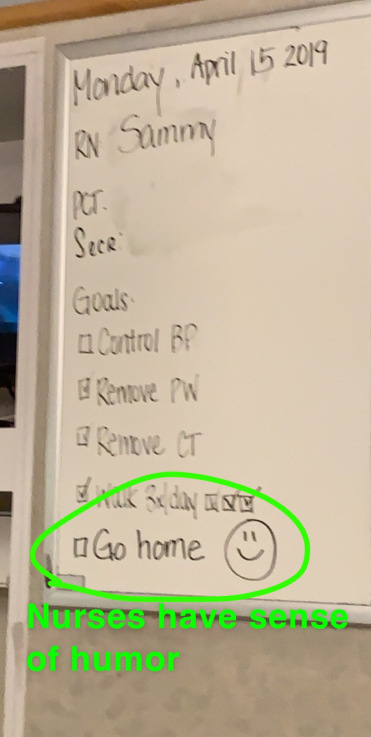
Eventually, after over three weeks total of hospital time, they decided to let me go.
I couldn’t believe it.
I stared out the window on the way home, and marveled at what I had missed. Spring had actually arrived, and the trees were starting to show themselves. I was a little uncomfortable over every bump in the road, but the closer I got to home, the better my mood improved. Tom got me out of the car, and in the house, and my cats actually greeted me…. You have no idea how much I worried that they wouldn’t recognize me. Instead, they curled their bodies around my legs and looked up and said hi! Even Squid, the little jerk of a feline, let me pet his head. Morkie stuck by my side like glue.
I showered for 30 minutes. Three weeks of hospital ickiness washed down the drain. That was about all I could handle the first day, so I climbed carefully into bed with the cats and marveled at being home. Not a lot of people thought I would ever make it back here, so I reveled in the moment of simply being alive.
The first week home was fairly simple, sleep a lot, walk three times a day up and down the driveway, take medication, check blood pressure, sit outside in the sun, eat, nap, read, write, and watch movies. My sternum ached, and I was worried about taking pain relievers to mask it, so I avoided them. Better to be in a little pain, rather than thinking you can conquer the world in one day. I did a little reflecting on what happened, but not much. I have no intention of changing my entire life. I think what happened was a medical problem, not a lifestyle problem. Of course, I won’t truly know this until I get further down the healing path, but if the doctors felt they did a good job with me and said I could ride again, then I will ride again. I am not that old, and my quality of life is actually quite good.

I marvel at what the doctors were able to accomplish to keep me here. This may sound horrifically morbid, but let’s face it. There are a lot of people who are depressed, some depressed to the point they want to destroy or eliminate themselves all together. One of the first thoughts I had was, wow, these guys worked so hard to fix an internal problem, I better respect that work they did! Not that I would ever consider myself an exceptionally depressed person, but when you go through something like this, you want to work harder to be a better person, and not take that away permanently.
But I really look at it. Do I want that in my body? What is it going to do for me? Help or hurt me? I was lazy about food before, but not a really terrible eater, just ate a lot of weird snacks. Now, I want real food, I even want to cook again, which probably means a lot of packing my own lunches for horse shows. Who knows, maybe I’ll start selling salad bowls out of my trailer, lol. I’m kidding. Sort of. I can still eat french fries, but I can’t imagine I will eat as many as I used to.

I look at food differently, even though I don’t have any dietary restrictions.I was slow to see people during the first part of recovery, because it can be exhausting to even talk, but hearing from friends is great, and it is astonishing to me how many people mobilized around me to lend a hand. People fought through fear, tears, and more just to hold my hand, rearrange my horses, move my car, belongings, and whatever else had to be done to make it easier for my family. I have no idea how to do anything else but try to pay it forward. I would imagine that part of me will be very different in the future. The stack of cards alone is astonishing!
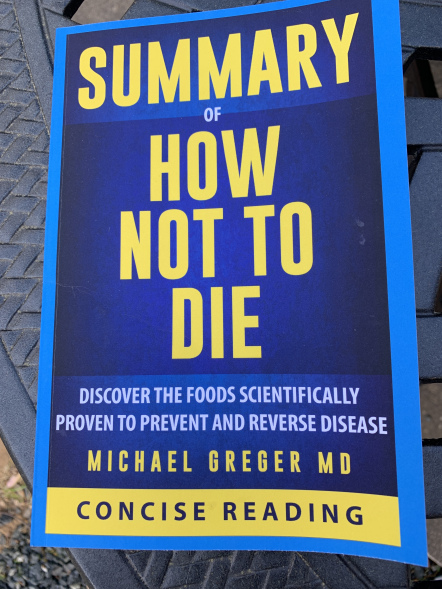
Further into recovery, hope grows.
The body really can heal, and when the body feels good, the mind feels good. My instructions were quite simple. Walk as much as you want, but don’t lift anything until the sternum heals. And when you are in the car, sit in the back seat so the airbag doesn’t blow through your chest if there is an accident. Roger. Got it. The hospital sent a Physical Therapist, who literally laughed out loud when I answered the door for him. Apparently, not many patients answer the door the first week home, but ok. He was about to turn tail and leave, but I asked him to stay in case I had questions, and he went over a few details, took a few notes, but admitted I was half the age of his normal patients. He didn’t think I needed help to get up and down the stairs, bade me farewell, and told me I would be fine, just keep moving. He wouldn’t answer me about when I could ride. Not his jurisdiction.
I can be a passenger! I can walk wherever I want! I do take full advantage of being mobile now, especially, ironically, since it is spring, and nothing says new beginning or starting over like spring. I sit still just long enough to try and finish my book I have been working on, and in between writing sessions, I move. A lot. Missing adventures is not going to be part of my new routine.
Every day I am astonished at what my body can do. Before I start, I remind myself I had to use a walker in the hospital. The first day home when I could only manage 5 minutes in my driveway because it had a slight incline. But each day the minutes increased, the distance increased, and my legs grew stronger. This week I walked to Kenilworth Mall, a mile from my house and shopped for food, then walked back. Two miles with a small hill! I count down the days until I return for my check up so I can brag about what I have accomplished…. just kidding, but really.
Advice?
I don’t think I should be giving advice, but I don’t want someone else to go through an Aortic Dissection, either. Take care of your freaking body, I guess. Be smart about what you put in it. Chew your food, instead of inhaling it. Equestrians are not stellar examples of good health, and even though what happened to me might have happened even if my body was living on purified water and organic foods, we could all do better. I feel like I’ve said this kind of stuff before though, with pleas to get mammograms, regular health checks, and treat your bodies like we treat our horses, but horse people come up with 101 excuses why they can’t be bothered. Well good luck to you. Those close to me have certainly made various doctor appointments, I assure you, because what they witnessed happen to me was not glamorous, and didn’t make them want to be part of my club……
Every life changing incident happens for a reason, (right?) and if God has other plans for me, then bring them, I am more than ready.
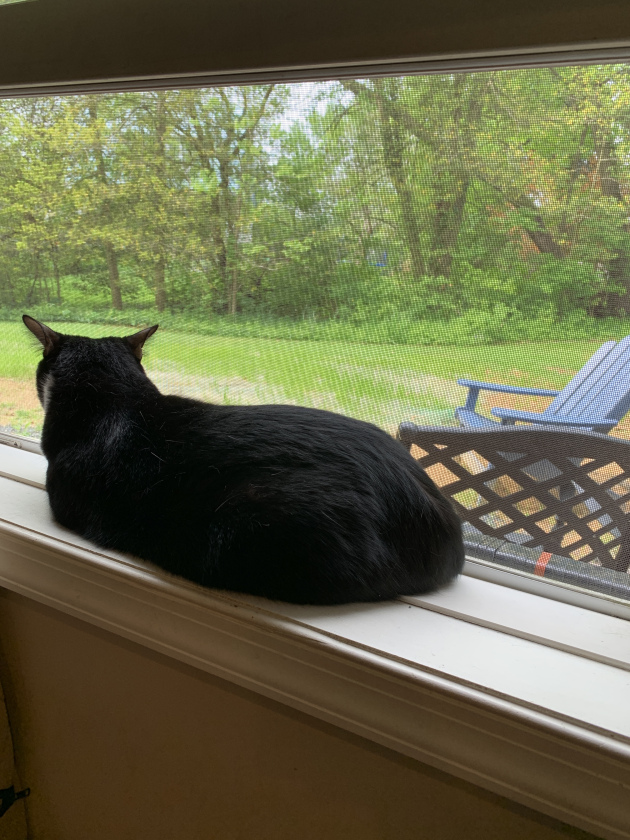
Disclaimer. I don’t know if I need a disclaimer but whatever, here it is.
This was my personal view of my experience, and it took me some time to decide how to share it. Each day I learn something new about what people have done for me these past six weeks and I am grateful. I thank you. I may never stop learning how you helped me, thought about me, prayed for me, reached out to my family, sent me a care package, or did something small for me without my knowledge. Whatever it was, it worked, and I am indebted to the community for the rest of my life. Again, thank you. The prayers seriously worked this time. I won’t forget any of it. xx.
